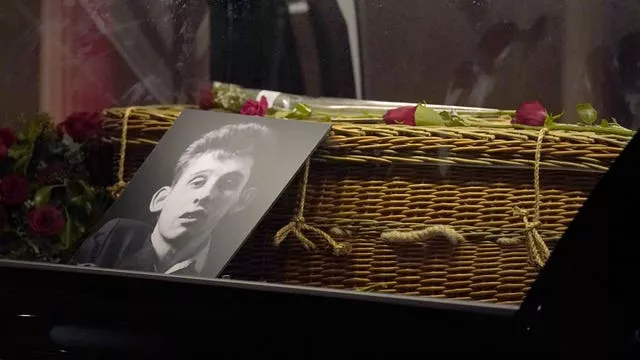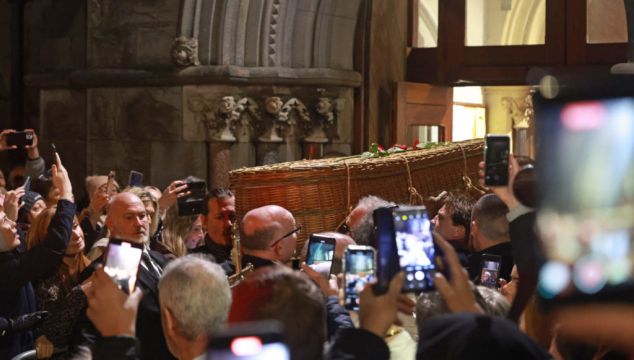Shane MacGowan “lit a fire that burns in Ireland and across the world”, his sister has said during his funeral ceremony in Co Tipperary.
Hollywood star Johnny Depp and U2 frontman Bono were among those who participated in the service for The Pogues singer, who died last week at the age of 65.
Also in attendance at Saint Mary of the Rosary Church in Nenagh were Nick Cave, actor Aidan Gillen, former Sinn Féin leader Gerry Adams and Irish president Michael D Higgins.

There was dancing inside the church as Fairytale Of New York was performed by Glen Hansard and Lisa O’Neill.
Earlier, mourners lined the streets of Dublin to say an emotional goodbye to MacGowan at a public procession through the Irish capital.
Hundreds gathered outside the Co Tipperary church on Friday afternoon as a host of stars arrived for the funeral.
Giving a eulogy to her brother, MacGowan’s sister Siobhan MacGowan said, while they were born in Kent, her brother’s “veins ran deep with Irish blood”, and he found his spiritual home in Co Tipperary, their mother’s childhood home.
“Shane absorbed the magical mayhem of this place, and along with the musical talents of his mother, the literary leanings of his father, and their enduring love for their son, it would be the greatest influence on his life,” she said.

Referencing MacGowan receiving a lifetime achievement award for his outstanding contribution to Irish life, music and culture, from President Higgins in 2018, his sister said he cried because their mother had not lived to see it.
“Tipperary and Ireland gave birth to a dream, he dreamed of one day being the teller of stories, the singer of the songs, he dreamed of following in the footsteps of those great Irish lyricists and musicians he so admired,” she said.
“He dreamed of continuing this proud tradition. He dreamed that one day he might add his name to those who had gone before him. And so when the president put that award in his hand, he knew he had achieved that dream.”
Mourners cheered and applauded.
She added: “You did what you said you were going to do in those long ago days in Tipperary and you did it with such heart and fire.
“A fire that is not dimmed by death for you have lit that fire and it burns now in Ireland and all over the world. And so Shane, with words from dad and I, your little sister and your father, we are so proud of you. So very proud of you, our darling.”

MacGowan’s widow, Victoria Mary Clarke, said at the funeral that she felt “there was nothing more that my life needed in order to be complete than to be with him”.
“I loved his presence and I loved his smile and I loved his voice,” she said.
“And I love the fact that 50 times a day we would laugh at each other and smile with each other and say I love you to each other. And we used to say ‘I’m so glad to see you’ and like we said that even though we’d been in the room together all day, we’d still say ‘I’m so glad to see you’.
“And I have yet to meet a couple who have that gift. I still have not yet met a couple, no matter how successful or glamorous or whatever they are, good looking. I just haven’t met anyone else who has that connection. So it would be greedy really to want more than we got. We got so much.
“And I know of course I’m going to miss him and I’m going to be devastated and I’m going to be crying and crying and crying, but at the same time as crying and feeling devastated I think it’s possible to also feel that my heart has got bigger.
“And it’s got so much bigger as a result of a relationship that it can never really go back. I can never go back to being the kind of person I was before I met him.”

Delivering the homily, Father Pat Gilbert said MacGowan had made Irish music cool around the world.
He added: “As teenagers, not being able to verbalise our uneasiness, displeasure, our uncomfortable assessment of what was happening all around us, we found an outlet, a channel, a conduit in the music and lyric of the day.
“In the words of Dickens, ‘It was the best of times and the worst of times’. But the music and the lyric were tremendous, and Shane was the master of them all.
“As Brendan Behan did in prose, Shane MacGowan did in poetry. The raw vibrant energetic earthy soul-filled expression gave us hope and heart and hankering.”
He added: “A poet, lyricist, singer, trailblazer, Shane reflected life as lived in our time, calling out accepted norms that oftentimes appear unacceptable.”
During the service, many of MacGowan’s best known songs were played, including a rendition of A Rainy Night In Soho by Cave.
Depp, who was best man at MacGowan’s wedding, read out one of the prayers of the faithful, while a recording of Bono delivering a reading was played.

Earlier in Dublin, MacGowan’s remains were carried in a glass horse-drawn carriage with his coffin adorned with an Irish tricolour flag and featuring a black-and-white photograph of the singer in his youth.
Ms Clarke travelled in a car behind the cortege, which was led by the Artane Band.
Members of the public threw flowers and musicians played A Pair Of Brown Eyes and Fairytale Of New York as the funeral procession passed Sweny’s pharmacy in central Dublin, which featured in James Joyce’s Ulysses.
Among those who turned out to pay their respects was Aidan Grimes, 60, who described MacGowan as an icon.
He said: “I remember the first time I saw The Pogues in the Hammersmith Odeon in 1985. It is imprinted in my mind forever, just the madness and mayhem, the raucous nature of his singing and the music they were playing.
“Through the years he evolved into a great poet and he will be sadly missed.
“I met him in Dublin about 15 years ago and he was a very charming, nice, friendly man. He talked about music and his time in London.
“I thought it was important to pay my respects. He was an icon of Dublin, just like Brendan Behan, Luke Kelly. His music will be listened to in 100 years’ time.”

Following the funeral mass, the funeral cortege travelled through Nenagh town centre and stopped briefly outside Phillip Ryan’s pub before the coffin was brought into the undertakers by family members.
A private cremation will follow.
MacGowan was born to Irish parents in 1957 in Pembury, Kent, and he soon moved to rural Tipperary where he was immersed in a culture of ceili bands and showbands.
The Pogues frontman died “peacefully” at 3am on November 30th with his wife and family by his side, a statement from his relatives said.
He was due to celebrate his 66th birthday on Christmas Day.







